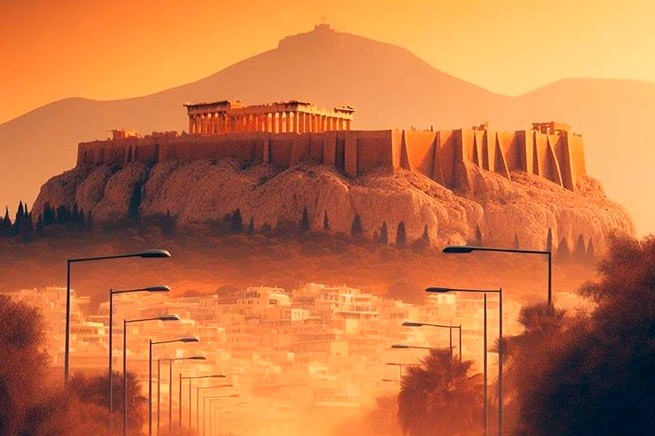The American Conservative published an article titled “Whitewashing corruption in Ukraine“, Contributing Editor Edition Ted Galen Carpenterin which, contrary to the generally accepted trend in the Western press, he shows a different face of the current Ukrainian government, namely, an undemocratic, corrupt and cruel dictatorship.
Statements by US and other Western officials, as well as widespread media reports, have created an incredibly misleading image of Ukraine. A concerted effort has been made to portray the country not only as a victim of brutal Russian aggression, but as a brave noble bulwark of freedom and democracy. The traditional narrative would lead us to believe that Ukraine is the Eastern European version of Denmark.
Proponents of this narrative argue that the ongoing war is not just a squabble between Russia and Ukraine over Kyiv’s ambitions to join NATO and Moscow’s territorial claims in Crimea and the Donbas. No, they insist, war is part of the global struggle between democracy and authoritarianism, and Ukrainian President Volodymyr Zelensky is a leader as worthy as the legacy of Winston Churchill. President Biden in his speech on March 26 of the war said that the conflict was “a battle between democracy and autocracy, between freedom and repression, between an order based on rules and an order governed by brute force.”
John Blake from CNN literally compared Ukraine with America in its war for independence. He stated that Ukrainians “are building monuments of democracy with their blood.” According to him, the world is “shocked by their struggle to repulse the mighty Russian army and preserve the birth of democracy in their homeland.” He added that “the war in Ukraine is not just a geopolitical struggle, it is a call to memory. The courage of the Ukrainian people is a reminder of what the United States once was – a “beacon of freedom”, where almost every student memorized a poem “Hymn of Concord” inscribed on the base of the Minuteman statue.”
In a USA Today article March 26 John M. Bridgeland, Director of the White House Domestic Policy Council under President George W. Bush, likewise expressed slavish admiration Zelensky and Ukraine’s alleged commitment to democracy. “The world sees the courage of Ukrainian President Volodymyr Zelensky and the Ukrainian people who are ready to die to defend their democracy and freedom,” he wrote. Indeed, Bridgeland said: “No price can be too high [для украинцев]to defend their democracy and beloved Ukraine.”
Fox News contributor and former CIA station chief Dan Hoffman arguedthat “at the heart of this conflict, Vladimir Putin is frightened by democracy. It’s not that NATO is a threat.” He added that “Putin hates democracy on the border with the Russian-speaking population and commercial ties with Europe. That’s why he launched this brutal attack that killed so many civilians in Ukraine, innocent civilians.”
The notion that Ukraine was such an attractive democratic model in Eastern Europe that its very existence horrified Putin may be a comforting myth for American politicians and pundits, but it is a myth. Ukraine is far from a democratic-capitalist model and an irresistible magnet for the groaning masses of Russia. Reality is darker and more disturbing: Ukraine been for a long time one of the most corrupt countries in the international system. In its annual report released in January 2022, Transparency International put Ukraine to 123rd place out of 180 countries it studied with 32 points on a scale from one to 100 points. By comparison, the notoriously corrupt Russia ranked slightly lower at 139th with 29 points.
Ukraine’s track record in defending democracy and civil liberties is not much better than in fighting corruption. IN Freedom House 2022 report Ukraine is listed in the “Partly Free” category with 61 points out of 100 possible. Other countries in this category include bastions of liberal democracy such as the Philippines by Rodrigo Duterte (55th), Serbia (62nd), Hungary (59th) and Singapore (47th). Interestingly, Hungary, which has been the target of fierce criticism from progressives in the West because of Prime Minister Viktor Orban’s conservative social policies, is eight points ahead of Ukraine, which receives uncritical praise from the same Western ideological factions.
Even before the war broke out, there were ugly examples in Ukrainian political governance authoritarianism. In just a few months since the 2014 Maidan revolution, attempts have been made to suppress internal criticism, which have intensified over the years. Ukrainian officials also persecuted political dissidents, applied censorship measures And foreign journalists were not allowed, whom they considered critics of the Ukrainian government and its policies. Such offensive actions have been criticized by Amnesty International, Human Rights Watch, the Organization for Security and Cooperation in Europe and other independent observers. Neo-Nazi battalion Azov was an integral part of the military and security apparatus of President Petro Poroshenko and retained this role during Zelensky’s presidency.
Indeed, some repressive measures intensified under Zelensky even before the war with Russia began. In February 2021, the Ukrainian government closed several (mostly, but not entirely pro-Russian) independent media outlets. They did it based on completely vague, open standards. Zelenskiy now used the war as an excuse to outlawing 11 opposition parties and the nationalization of several media outlets. These are hardly appropriate measures in a democracy, even in wartime.
It is appropriate to sympathize with the Ukrainians, who are experiencing terrible suffering as a result of Vladimir Putin’s decision to go to war. Whatever the level of provocations by the US and its NATO allies, and whatever the willingness of Ukraine to engage in these provocations, Russia’s response has been over the top. This has led to a dangerous breach of peace in Europe and a humanitarian catastrophe. However, it is possible to condemn Putin’s actions and even applaud Ukraine’s military resistance without creating a false impression of the Ukrainian political system. The country is not a symbol of freedom and liberal democracy, and war is not an existential struggle between democracy and authoritarianism. At best, Ukraine is a corrupt, quasi-democratic entity with worrisomely repressive policies.
Given this sobering reality, calls for Americans to “take the side of Ukraine» are inappropriate. Preserving Ukraine’s independence and territorial integrity is certainly not worth the United States risking war with a nuclear-armed Russia.
Ted Galen CarpenterSenior Fellow for Defense and Foreign Policy Studies at the Cato Institute and Contributing Editor The American Conservativeis the author of 12 books and more than 950 articles on international affairs.






More Stories
Poll: which European countries are ready to defend their homeland to the last
K. Mitsotakis announced readiness for the fire season
Greece must transfer the Patriot PAC-3 system to Ukraine with US “guarantees” against the Turkish threat